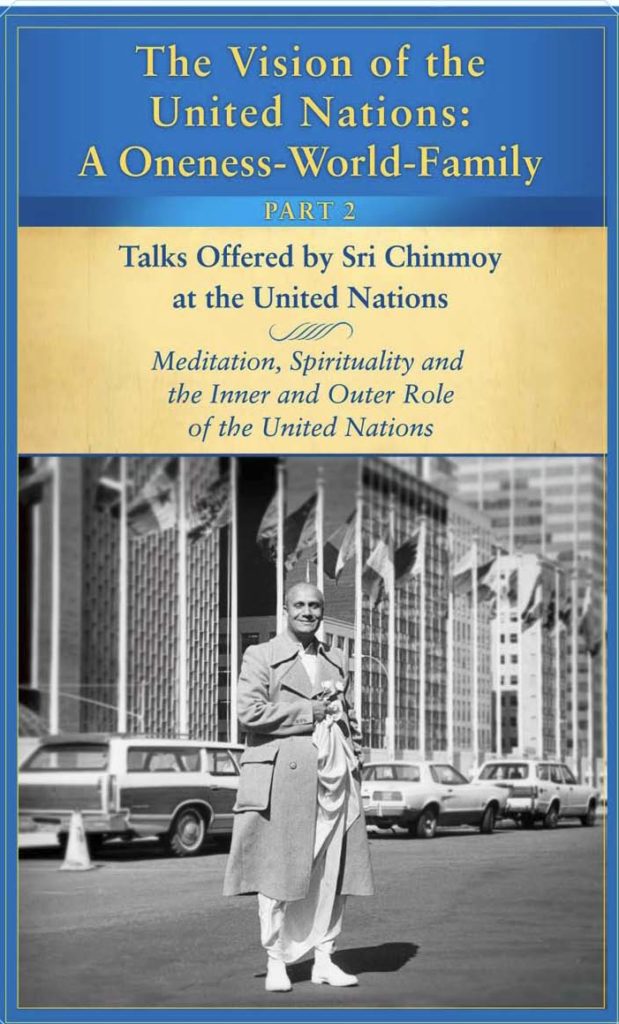
During his nearly four decades of service at United Nations Headquarters in New York, Sri Chinmoy offered many talks on meditation, spirituality and the inner and outer role of the United Nations. Following are just a few excerpts from his illumining lectures, which continue to offer great insight, wisdom and hope for a peaceful oneness-world. This selection of 50 talks is presented in honour of the 50th anniversary of Sri Chinmoy: The Peace Meditation at the United Nations on 14 April 2020, and the 75th anniversary of the United Nations on 24 October 2020.
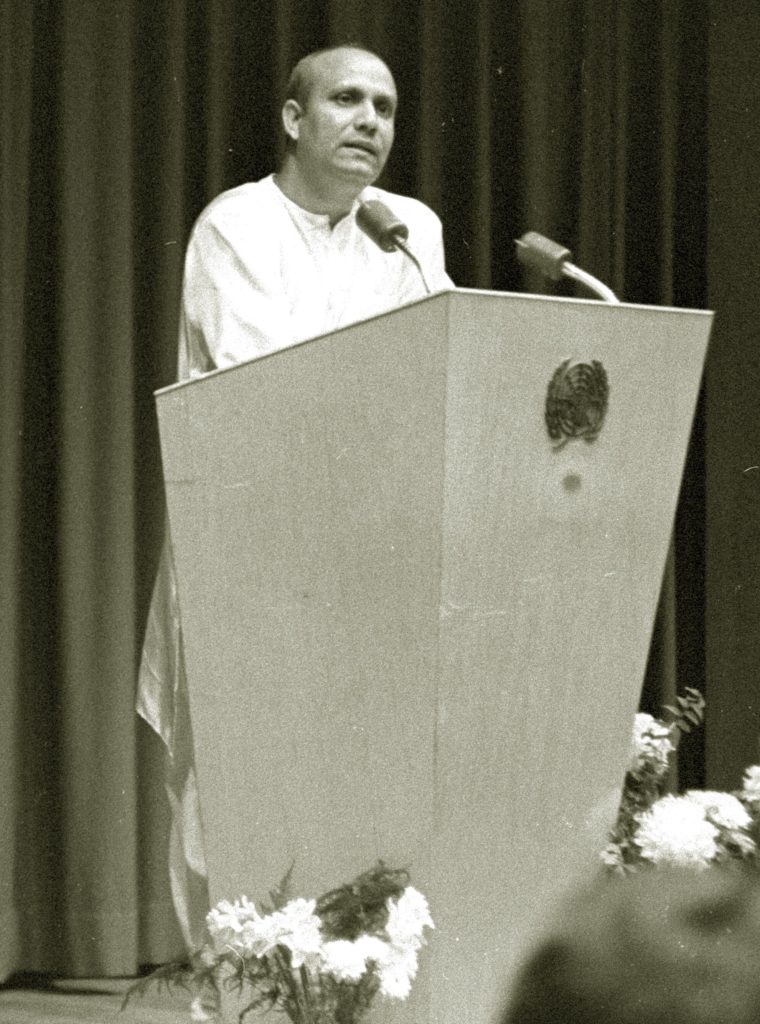
On 12 February 1971, Sri Chinmoy offers the first in a series of talks delivered at the UN in honour of the late Secretary-General Dag Hammarskjöld. Many of the talks in this Dag Hammarskjöld Lecture Series took place in the UN Dag Hammarskjöld Auditorium, where Peace Meditation Group programmes and meditations were often held.
Celebrating 50 Years with 50 Talks
During his nearly four decades of service at United Nations Headquarters in New York, Sri Chinmoy offered many talks on meditation, spirituality and the inner and outer role of the United Nations. Following are just a few excerpts from his illumining lectures, which continue to offer great insight, wisdom and hope for a peaceful oneness-world.
This selection of 50 talks is presented in honour of the 50th anniversary of Sri Chinmoy: The Peace Meditation at the United Nations on 14 April 2020, and the 75th anniversary of the United Nations on 24 October 2020. The talks originally appeared in various books over the years, and were compiled under the title The Garland of Nation-Souls published in 1995.* Online references from the original publications are listed at the end of each talk, for ease of reference to the original unabridged text. Some of the wording has been taken from the 1995 printed version, which will be available on SriChinmoyLibrary.com in the future.
This publication is a companion volume to The Vision of the United Nations: A Oneness-World-Family, Part 1, which contains excerpts from 50 questions answered by Sri Chinmoy at the United Nations. The booklet was also printed in 2019 and reprinted in 2020 in honour of the 50th anniversary of the Peace Meditation Group.
*Sri Chinmoy, The Garland of Nation-Souls, Health Communications, Inc., 1995.
Reference to unabridged text
The talks appearing in this booklet have been condensed from the original. For ease of reference to the original unabridged text, references to the online versions are listed after each talk. The full text can be accessed on SriChinmoyLibrary.com by adding the abbreviated reference, e.g., /xx-##, provided at the end of each talk.
Back to Top Button

Back to Top Button
Use the “Back to Top” indicator on right column to return to Top
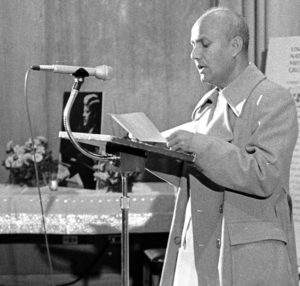
On 22 November 1977, Sri Chinmoy opens a Peace Meditation Group programme and concert at the UN in soulful remembrance of the late President of the United States, John F. Kennedy, marking fourteen years since the day of his assassination. The event, which was televised live by WNBC-TV, included tributes by Ambassador Eamonn Kennedy of Ireland and Ambassador Zenon Rossides of Cyprus, as well as several songs dedicated to President Kennedy composed by Sri Chinmoy and performed by the Peace Meditation Choir.
Selected Talks
1. What Is the United Nations Really Doing for Humanity?
The body of the United Nations is trying to serve humanity. The mind of the United Nations is longing to inspire humanity. The heart of the United Nations is crying to love humanity.
The United Nations as a whole wants to offer peace. Peace and the United Nations are inseparable.
Peace does not mean the absence of war. Peace means the presence of harmony, love, satisfaction and oneness. Peace means a flood of love in the world family.
To me, the United Nations is great. Why? Because it has high principles. To me, the United Nations is good. Why? Because it leaves no stone unturned to transform these principles into living realities.
The world must remember that in the transformation of principles into realities, time is a great factor. If we go deep within, we can easily observe how many things have been accomplished in the brief years of the United Nations existence.
The United Nations is trying to ameliorate the teeming afflictions that weigh so heavily on the world’s shoulders. It is trying so hard to cancel the world’s inequalities. The United Nations sings one song: the song that says it is love-power that will conquer the world. No other power can conquer the world. When love-power conquers, the conquest is not for the expansion of influence, but for the illumination of existence.
People say the United Nations is imperfect. I wish to ask them what organisation on earth is perfect. They say the United Nations has not fulfilled human needs. I say we have not given full opportunity, not to speak of full authority, to the United Nations to do the needful.
Without the least possible hesitation we can say that the heart of the United Nations is crying for perfection. But perfection is not a one-man game. It is a collective game that is played by all. The capacities of all human beings have to be offered, as well as the capacities of all those who work for the United Nations.
Many years ago, the League of Nations had a lofty, sublime, supernal vision: a world united and at peace. The United Nations is trying to transform that vision into reality. Let us consider the fulfilled vision as the height of Mount Everest, while the present reality is the foot of Mount Everest. We are now still at the foot of the mountain, but if we go deep within, we will see that we have definitely begun to climb. We know how difficult it is to climb all the way to the top, but slowly and steadily the soul of the United Nations is offering its light to the body of the United Nations, which is the world, so that it can reach the height of the lofty vision seen so many years ago. This vision cannot and will not always remain a vision, because inside the vision itself is reality. We may see the manifestation of that reality in four hundred years or in one hundred years or in fifty years or in ten years, depending on what the world sees and feels in the heart of the United Nations on the strength of its identification.
If we want to know what the United Nations is really doing for humanity, each one of us has to ask himself or herself the same questions, for each of us represents humanity. Are we really seeing the bright side of the United Nations? Are we sincerely working for the fulfilment of the vision of the United Nations? Are we wholeheartedly trying to become one with the struggles of the United Nations? Are we deeply concerned about the United Nations and its role in the world community?
The United Nations has a big heart. Irrespective of human attainment, irrespective of human assessment, it will offer its nectar-drink to each human being on earth.
Sri Chinmoy, The Tears of Nation-Hearts, 1974 (/tnh-22)
2. The World-Aim and the World-Goal
During meetings of the Peace Meditation Group, Sri Chinmoy gave a series of lectures on great men and women. Following is the introduction to the first talk in this series.
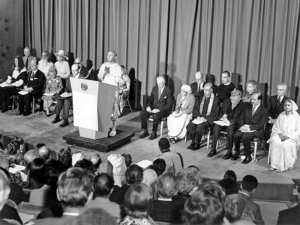
On 24 October 1975, Sri Chinmoy offers the opening silent meditation at an Interfaith Meeting entitled “One is the Human Spirit”, held in the UN Dag Hammarskjöld Auditorium on UN Day in honour of the UN’s 30th anniversary. The programme featured the UN Secretary-General and several religious leaders, including Mother Teresa (front row, fifth from right). The event was organized by the Temple of Understanding.
If we say that the United Nations is the result of the twentieth century awakening, then we are mistaken. The United Nations is the outgrowth of the inner awakening of human beings from time immemorial. It is the joint aspiration of the hoary past, the immediate past, the present and the fast- approaching future that will bring about the union of the world-soul and the world-goal. The human beings who are now here on earth can tangibly see and feel what the United Nations on the outer plane can do.
Each individual nation has aspiration of its own. Again, each individual nation has human beings who aspire for a better, more illumining and more fulfilling world. These seekers have expressed their aspiration in and through various fields: spirituality, religion, philosophy, science, music, art, poetry and so forth. The United Nations is not only for the delegates and the representatives of the various nations. It is for all those who have aspired and do aspire and will always aspire.
Many souls came and presently are coming and eventually will come into the world for the world-aim and the world- goal. That aim and that goal is to see a beautiful, fruitful, unifying and united oneness-world.
Sri Chinmoy, Reality-Dream, 1976 (/rd-8)
3. The Inner Message of the United Nations
The outer message of the United Nations is Peace. The inner message of the United Nations is Love. The inmost message of the United Nations is Oneness. Peace we feel. Love we become. Oneness we manifest.
The United Nations has a mind, a heart and a soul. Its mind tries to offer flowing Peace. Its heart tries to offer glowing Love. Its soul tries to offer fulfilling Oneness. In the near future, a day will dawn when the message of the United Nations will be absorbing to the child, elevating to the common man, thought provoking to the highly educated, and inspiring to the seeker.
The League of Nations was a dream-seed. The United Nations is a reality-plant. The aspiring and serving life of man’s universal oneness will be the eternity-tree.
In his address to the United Nations in October 1965, Pope Paul VI said:
“No more war: war never again! Peace. It is peace which must guide the destinies of people and of all mankind.”
Each individual has every right to love his nation; but he must also dedicate himself in order to immortalise his nation’s relationships, inner and outer, with the rest of mankind, so that all can run together for the universal good of humanity.
Sri Chinmoy, The Tears of Nation-Hearts, 1974 (/tnh-1)
4. The United Nations as an Instrument of Human Unification
The United Nations is not a thing to appreciate, admire or adore. Rather, it is the way, the way of oneness, that leads us to the Supreme Oneness.
Let us not ask the United Nations what it has done. Let us not even ask ourselves what we have done. But let us only ask our- selves whether we are of the United Nations and for the United Nations. If we say we are of the United Nations, then our source is peace, infinite peace. And if we say we are for the United Nations, then our manifestation is delight, eternal delight. Our source is peace and our manifestation is bliss on earth. So if we know what we are and what we stand for, then the United Nations becomes for us the answer to world suffering, world darkness and world ignorance.
The inner vision of the United Nations is the gift supreme. This vision the world can deny for ten, twenty, thirty, forty, one hundred years. But a day will dawn when the vision of the United Nations will save the world. And when the reality of the United Nations starts bearing fruit, then the breath of Immortality will be a living reality on earth.
Sri Chinmoy, The Tears of Nation-Hearts, 1974 (/tnh-21)
5. The Garland of Nation-Souls
The nation that soulfully cries for inner development and devotedly cries for outer growth can alone be in the vanguard of the teeming nations. A nation falls when it deliberately and vehemently resists the idea of being on the side of Truth. A nation can flourish when it loves the world, not for what the world will give in return, but for the sake of love. Selfless love, true love, never ends, never fails. Love is its own immediate reward.
To me, the real worth of nations lies in their united principles. The united principles must needs have cooperation. If there is no cooperation, then the united principles will bear no fruit whatsoever. The present-day world needs cooperation.
Supremely significant are the words of former Secretary- General U Thant: “I can think of no worthier task for a man or a woman to be engaged in than that of creating the tools for international cooperation and working for the betterment of his fellow human beings.” Also, he soulfully affirmed: “Our work at the United Nations gives us the privilege of contributing actively from day to day in the ardent process of building peace.”
Each nation right now needs peace. Man seeks peace because he needs peace desperately. Man welcomes peace because it is in peace alone that he can have his own true achievement and fulfilment. The moment he needs peace, he has to feel that sooner or later he will receive it. And when his inner being is flooded with peace, he has to spread this peace.
War and peace. Inner war is constant. At every moment a sincere seeker has to fight against his own doubt, imperfections, limitations, bondage and death.
War and peace. Man invents war. Man discovers peace. Man invents war from without. Man discovers peace from within.
Sri Chinmoy, The Garland of Nation-Souls, 1972 (/gns-3)
6. The United Nations: Leader of the World-Family
When a nation is ready to feel that other nations are an extension of its own being, when a nation becomes aware that all nations belong to one family, one source, and have one common goal, then that particular nation can easily teach or share its lofty achievements. Each nation knows inwardly that satisfaction and perfection lie only in self-giving.
All nations are pilgrims, eternal pilgrims, walking along the same road, the road of Eternity. On the way, some become tired and want to take rest. They do not have the energy to walk any farther. At that moment, if the nations that are ahead can feed and energise those that have fallen back, then the lagging ones can easily keep pace with the nations that are marching speedily.
The great mystic thinker Kahlil Gibran once said something most soulfully true: “The significance of man is not in his attainment but in what he longs to attain.” The present-day world has acquired money-power, technology-power, machine-power, but this has not brought it any satisfaction. It longs to love the world, to feel the heart of the world and to become one, inseparably one, with the world at large.
Unless each human being cooperates most soulfully with the will of the United Nations, unless and until we become inseparably one with the ideals of the United Nations, we can never be happy and fulfilled. The United Nations can teach us how to share. If we do not share with others what we have and what we are, we are bound to feel unsatisfied, no matter what we achieve and what we grow into.
The greatest wise man of the past, Socrates, taught us some- thing very profound when he said, “I am not an Athenian, nor am I a Greek. I am a citizen of the world.” If each individual in each nation can proclaim this message, then the message of the United Nations, the message of love, of brotherhood, of peace, of soulful sharing, can easily be received, embraced and executed by the entire world.
Sri Chinmoy, The Tears of Nation-Hearts, 1974 (/tnh-23)
7. Each Nation in Its Place Is Great
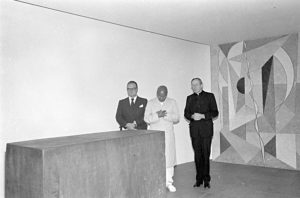
On 15 November 1977, a programme sponsored by the Peace Meditation Group marks the 20th Anniversary of the redesign of the Meditation “Room of Quiet” adjacent to the UN General Assembly Lobby. This space was redesigned by Dag Hammarskjöld in 1957. A few minutes of silence was observed in the small but symbolic Meditation “Room of Quiet” (shown left to right, Robert Muller, UN Deputy Under-Secretary-General; Sri Chinmoy, leader of the Peace Meditation Group; and Monsignor G. Cheli, Permanent Observer of the Holy See to the UN). The formal programme followed in Conference Room 4. Speakers included the Secretary of Foreign Affairs of the Philippines, Carlos P. Romulo (an original signer of the UN Charter in San Francisco).
A nation is a limb of the universal body. Each limb is necessary, essential and indispensable. Each nation represents humanity’s hope, humanity’s promise and humanity’s progress. Hope was our yesterday’s treasure. Promise is our today’s treasure. Progress shall be our tomorrow’s treasure.
Each nation can be great by virtue of a few divine qualities. A nation can be great by virtue of its simplicity. A nation can be great by virtue of its sincerity. A nation can be great by virtue of its humility. A nation can be great by virtue of its sense of duty, both national and international. A nation can be great by virtue of its prosperity, both inner and outer. Finally, a nation can be great by virtue of its generosity, constant and supreme generosity.
A great nation is that nation which offers inspiration to other nations. A greater nation is that nation which offers concern to other nations. The greatest nation is that nation which offers heart’s love, spontaneous love, to other nations. With inspiration we begin to form our universal family. With concern we strengthen our universal family. With love we feed and fulfil our universal family.
In size, in capacity, in receptivity, all nations may not have the same status. But each nation is indispensable in its own way. Each nation is like a drop, a tiny drop or a mighty drop, in the vast ocean of divine, fulfilling, fruitful consciousness. It is all the drops combined that make up the ocean. Again, it is the ocean that manifests or fulfils its existence through the different drops, small and big alike.
Each nation is humanity’s conscious cry for perfect Perfection. It is in and through each nation that humanity can make the ultimate progress.
Sri Chinmoy, The Tears of Nation-Hearts, 1974 (/tnh-14)
8. The General Assembly
This talk was given on Tuesday, 17 September 1974 on the occasion of the opening of the twenty-ninth session of the Gen- eral Assembly.
The General Assembly is a family gathering of a very special family. Unlike most families, this family knows what to say, what to do and what to become. What to say? The members of this family say that they wish to live together forever. What to do? They try to understand one another; they try to share with one another their teeming ideas and glowing ideals. What to become? They try to become a cry; they try to become a hope; they try to become a promise; they try to become a smile – a cry that elevates them, a hope that feeds them, a promise that reveals them, a smile that immortalises them.
The General Assembly signifies interdependence. It represents a song of the community of nations, a song of group- souls. While singing this song, these souls will climb high, higher, highest until they one day reach the transcendental Vision of world union.
Today the General Assembly begins with new hope, new determination and new aspiration to discover something more illumining and more fulfilling. We, too, the seekers of infinite truth and light, can begin with new hope, new determination and new aspiration as we try to become more sincere, more dedicated.
Sri Chinmoy, The Seeker’s Mind, 1978 (/sm-1)
9. No Nation Is Unwanted
No nation is unwanted. Every nation is wanted. Every nation is needed. Every nation is indispensable. Each nation is great. The greatness of each nation lies in its deep love for other nations and in its self-giving to other nations.
Why does an individual love others? An individual loves others because he knows that if he does not love others, then he remains imperfect and incomplete. And what applies to an individual human being can equally, appropriately and convincingly apply to a nation.
Now, a nation may have hundreds of good, divine and even astonishing qualities, but if that nation is wanting in the inner quality, the feeling of oneness, then it cannot have true satisfaction. Again, if a nation is not blessed with many striking qualities and illumining capacities but nonetheless has a sense of inseparable oneness, then that nation is the creator of fulfilling joy, the distributor of fulfilling joy and the fulfiller of fulfilling joy.
Each nation is a petal of a flower, an inner rose, an inner lotus.
Each nation has the capacity to fulfil all nations through self- giving. Here at the United Nations, each nation shall offer its illumining capacities and fulfilling qualities to all the other nations. Together all nations will walk, together all nations will run, together all nations will fly and dive toward the same goal, the goal of everlasting Reality.
Sri Chinmoy, The Tears of Nation-Hearts, 1974 (/tnh-13)
10. The United Nations Dedication
It is not in vain or without any purpose that the United Nations has come into existence. The suffering nations need a place for consolation; the sacrificing nations need a place for appreciation. The sleeping, unaspiring, unawakened world is not yet receiving the Light of the United Nations. There are many things that the world could get from the dedication of the United Nations; but if the world is not receptive, it is not the fault of the United Nations. The heart of this place is dedication, the soul of this place is concern, the body of this place is for the illumining expansion of human consciousness.
At the United Nations we see the oneness of mental philosophy and psychic religion. All philosophies and all religions are running towards the same Goal. Each religion teaches us to be nice, kind, honest and devoted. Philosophy teaches us how to see the Truth, and religion helps us in applying the Truth in our outer life. Here at the United Nations all major religions meet. From the spiritual point of view, the contribution of each nation is sublime.
Sri Chinmoy, The Garland of Nation-Souls, 1972 (/gns-22)
11. Philosophy, Religion and Yoga
Philosophy sees the wisdom in truth. Religion realises the code of life with truth. Yoga becomes the delight for truth.
Philosophy ascends from the searching mind. Religion ascends from the crying heart. Yoga ascends and descends: ascends for the discovery of the silence-world and descends for the mastery of the sound-world.
Philosophy is brave. It tries to understand the higher world. Religion is wise. It tries to acknowledge the outer world. Yoga is pure. It tries to accept the higher, the outer and the inner worlds.
Philosophy inspires us to become great. Religion inspires us to become good. Yoga inspires us to become perfect.
The United Nations philosophy is to sincerely please all the countries. The United Nations religion is to generously help all the countries that are abiding by the truth principles. The United Nations yoga is to sleeplessly turn the entire world into a peaceful and soulful oneness-home.
Sri Chinmoy, The Inner Role of the United Nations, 1993 (/ir-19)
12. The Inner Role of the United Nations, Part 1
The U.S. State Department invited Sri Chinmoy to come to Washington, D.C. on 6 June 1980 to address its “Open Forum,” a policy discussion group inaugurated during the Viet Nam War to acquaint policy-makers with different points of view on critical issues of the day. Sri Chinmoy was asked to speak on the inner role of the United Nations. Sri Chinmoy also delivered this same talk at United Nations Headquarters on 13 June 1980 as part of his Dag Hammarskjöld lecture series. He offered a different talk by the same name at the United Nations Office at Geneva on 16 June 1980.
The term ‘united’ has always had a special appeal to all human souls, and this transcendent idea has remained in vogue down the sweep of centuries. Americans felt the supreme necessity of a ‘united’ country, and the thirteen colonies gradually, steadily, unerringly and selflessly became unified. Similarly, although at the present time peace is not reigning supreme in the United Nations, there shall definitely come a time when peace-flood will inundate the ‘united’ nations around the globe.
Not in vain is the Headquarters of the United Nations in the United States. Is there any place that can be more appropriate than New York City to house the vision of universal oneness, which is in the process of being realised and manifested in the heart and soul of humanity?
True, at times the United States and the United Nations are not on good terms. But each knows perfectly well that the one adds tremendous value to the other in terms of prestige, recognition, self-awareness and oneness-perfection. In silence, unreservedly the United States gives the United Nations confidence-light. In silence, unreservedly the United Nations gives the United States oneness-height. The concept of the United Nations has verily come from the United States, unconsciously if not consciously, for the United States had this united feeling years ago.
The inner role of the United Nations amuses the intelligentsia, inspires the world-peace-lovers and nourishes the world-oneness-servers.
The United Nations is often misunderstood. Perhaps its fate will always remain the same. But is there anybody who is not misunderstood? Misunderstanding is the order of the day. But that does not and cannot prevent the United Nations from making its soulful self-offering in the creation of a oneness- home for all.
The United Nations has been marching resolutely and triumphantly towards its inner goal. Indeed, the remarkable leadership of its Secretaries-General has made its outer success and inner progress not only convincing but also fulfilling.
Secretary-General U Thant valued unreservedly the inner or spiritual obligations of the United Nations. Him to quote: “I have certain priorities in regard to virtues and human values. I would attach greater importance to moral qualities or moral virtues over intellectual qualities or intellectual virtues – moral qualities, like love, compassion, understanding, tolerance, the philosophy of live and let live, the ability to understand the other man’s point of view, which is the key to all great religions. And above all, I would attach the greatest importance to spiritual values, spiritual qualities.”
Secretary-General Dag Hammarskjöld offered the hallowed message-light that each individual has a responsibility to his own inner role. According to him, each individual must strive inwardly as well as outwardly to achieve abiding peace: “Our work for peace must begin within the private world of each one of us. To build for man a world without fear, we must be without fear. To build a world of justice, we must be just. And how can we fight for liberty if we are not free in our own minds?”
Illumining leaders from all over the world who are serving the United Nations remind us of the undeniable fact that the earth cannot exist without the world body – the United Nations – in spite of its apparent failings and problems.
The outer role of the United Nations is greatness remarkable. The inner role of the United Nations is goodness admirable.
The late President John F. Kennedy spoke not only to his fellow Americans but to all his fellow beings when he proclaimed in his speech to the UN General Assembly, “My fellow inhabitants of this planet, let us take our stand here in this assembly of nations. And let us see if we, in our own time, can move the world towards a just and lasting peace.”
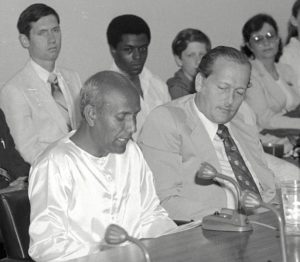
On 6 June 1980, Sri Chinmoy delivers a talk at the US State Department in Washington, D.C. entitled “The Inner Role of the United Nations.” He later offered this talk at UN Headquarters in New York on 13 June, and elaborated further on this subject during a talk at the UN Office at Geneva on 16 June.
The U.S. Declaration of Independence and the U.N. Charter are humanity’s two aspiration-dedication-realities. The beacon- light of the Declaration of Independence shows countless human souls the way to their destined goal: “We hold these truths to be self-evident, that all men are created equal, that they are endowed by their Creator with certain unalienable Rights, that among these are Life, Liberty and the pursuit of Happiness. That to secure these rights, Governments are instituted among Men, deriving their just powers from the consent of the governed”
The United Nations Charter bravely and heroically proclaims these rights for all of humanity and seeks “to reaffirm faith in fundamental human rights, in the dignity and worth of the human person, in the equal rights of men and women and of nations large and small, and to establish conditions under which justice and respect for the obligations arising from treaties and other sources of international law can be maintained, and to promote social progress and better standards of life in larger freedom.”
The outer role of the United Nations is a colossal hope. The inner role of the United Nations is a generous assurance. The supreme role of the United Nations is a prosperous satisfaction.
Hope is a growing plant. Assurance is a blossoming tree. Satisfaction is a delicious fruit.
At the present stage, the United Nations is a growing plant. Is it not absurd for us to expect the United Nations to solve the overwhelming problems of centuries? There shall come a time when this tiny plant will grow into a huge tree, with countless leaves, sleepless flowers and spotless fruits – sheltering, inspiring and nourishing all those who desperately need its protection-shelter, rejuvenation-inspiration and satisfaction- nourishment.
Sri Chinmoy, The Inner Role of the United Nations, 1993 (/ir-18)
13. Tribute to Dag Hammarskjöld
On the anniversary of Dag Hammarskjöld’s birth, 29 July 1976, the Peace Meditation Group dedicated a programme to the late Secretary-General, held in the Dag Hammarskjöld Auditorium at the UN. Italicized quotes within this text are from Dag Hammarskjöld’s Markings.
We wish to offer our soulful hommage to this great soul and also we invoke this great soul to bless us in our life of inner aspiration and our life of outer dedication. (A short meditation followed.) Dag Hammarskjöld was a great man, a good heart, a soulful life, a possessor of perfect vision-light.
They say that the mind’s brilliance and the heart’s oneness do not and cannot go together, because the mind tends to enjoy a sense of separativity. But Dag Hammarskjöld’s life amply proved that the mind’s brilliance and the heart’s oneness can and do go together.
The practical man in Dag Hammarskjöld teaches us, “Do not look back, and do not dream about the future, either. Your duty, your reward, your destiny, are here and now.”
The theoretical soul in Dag Hammarskjöld teaches us,
The moon was caught in the branches: Bound by its vow,
My heart was heavy. Naked against the night
The tree slept. “Nevertheless, Not as I will…”
The burden remained mine: They could not hear my call,
And all was silence.
Dag Hammarskjöld was a man of unparalleled duty. Duty demands capacity. He perfectly mastered the art of duty. Out of his heart’s magnanimity, he shares with us its quintessence: “Somebody placed the shuttle in your hand. Somebody who had already arranged the threads.”
Every time I go to the Secretary-General’s birthplace, Uppsala, Sweden, I make it a special point to offer my soulful hommage to his Long Home. His life’s sterling simplicity illu mines my life of aspiration, and his soul’s ever-glowing luminosity fulfils my life of dedication.
Sri Chinmoy, Reality-Dream, 1976 (/rd-22);
Sri Chinmoy, The Seeker’s Mind, 1978 (/sm-3)
14. U Thant: A Life of Humility and a Heart of Nobility
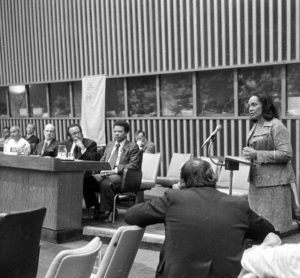
On 29 November 1977, Coretta Scott King, widow of the Reverend Martin Luther King Jr. and member of the US delegation to the UN, gives the keynote address at a programme highlighting the universal vision and inspired leadership of the late Dr. King. The event, organized by the Peace Meditation Group and held in UN Conference Room 4, included remarks by Paul O’Dwyer, President of the City Council of New York City; Ambassador Salim A. Salim of Tanzania, Chairman, Special Committee of 24 on Decolonization; Ambassador Leslie O. Harriman of Nigeria, Chairman, Special Committee against Apartheid; Ambassador Allard Lowenstein of the United States; and Robert Muller, UN Deputy Under-Secretary-General.
To most people, peace is something that belongs in a dream- land. Since it belongs to a dream-land, we only talk about it. To U Thant, peace is something that belongs to the reality- world. Therefore he lived in the reality-world of peace and was a solid and treasured member of the reality-peace-world.
To us, oneness is something that we seem to want but do not actually feel the need for. To U Thant, oneness was something of constant need, something indispensable.
He struggled calmly. He suffered ceaselessly. He hoped sleeplessly. Again, he knew how to dream of success. He knew how to become the river of progress.
His conviction was that man is good, perfect and divine, for that is what each individual in the inner world eternally is.
U Thant’s life of humility was the result of his heart’s nobility.
Sincerity spoke through him, integrity breathed in him, spirituality walked with him. He knew the world-problem: ignorance. He knew the world-answer: meditation, and this he practised in silence.
His heart of brotherhood was misunderstood. His life of sacrifice was not valued. But his vision of oneness-goal will eternally be pursued by aspiring humanity.
Sri Chinmoy, Union-Vision, 1975 (uv-9)
15. The United Nations and World Union
The United Nations is the seed. World union is the fruit. Both are of supreme importance.
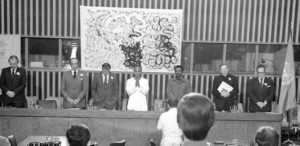
On 14 December 1977, participants join in a minute of silence at a Peace Meditation Group programme, “Oneness-Earth”, held in UN Conference Room 4. The event was filmed by CBS-TV and later broadcast for the holiday season. Speakers included (left to right) John Grun, Director, UN International Year of the Child Secretariat; Ambassador Jorge Illueca of Panama; Ambassador Allard Lowenstein of the United States; Sri Chinmoy, leader of the Peace Meditation Group; Thami Mhlambiso, Representative of the African National Congress; Monsignor G. Cheli, Permanent Observer of the Holy See to the UN; and Robert Muller, UN Deputy Under-Secretary-General. On display behind the podium was Sri Chinmoy’s painting entitled “United Nations: the Heart-Home of the World-Body.” It was dedicated to United Nations efforts for peace, and prior to the programme it had been exhibited around the world as a proponent of goodwill and world-oneness.
The United Nations is the morning. World union is the day. When the heart of the morning is flooded with inner light, then it is not only possible but almost certain that the entire day will be flooded with light. On very, very rare occasions we see otherwise. But most of the time morning shows the day.
The United Nations tells us where truth is. World union tells us what truth is. Where is truth? Truth is in self-giving. What is truth? Truth is man’s transformation of his earth-bound nature.
The United Nations is a group of pilgrims on a journey. As the pilgrims walk along the path of light toward the same destination, they feel mutual appreciation. From appreciation they go one step ahead to love. Then from love they move to oneness.
He who is a true member of the United Nations treasures a shared life in a shared world.
Inner poverty is our lack of faith in our divine reality, our lack of faith in our capacity to realise the ultimate Truth. Unless and until we have put an end to our inner poverty, the problem of the outer poverty cannot be solved.
Inner poverty is disharmony and restlessness; inner plenitude is peace, harmony and love. Peace is found in self-giving and in our recognition of others’ good and divine qualities. The more we see the divine qualities in others, the sooner we will establish world peace.
In the inner world all the nations are equally important, for in the inner world each nation has a free access to world peace, world light, world harmony and world perfection. But in the outer life the nations that consciously aspire and cry for light are in a position to help the less advanced nations that are walking behind.
Sri Chinmoy, Union-Vision, 1975 (/uv-7
16. Inner Flames at the United Nations
Inner flames signify aspiration. Aspiration illumines the undivine in us and fulfils the divine in us. Our loving heart is the divine in us. The loving heart consciously and unreservedly creates a new world: a world of hope, a world of light, a world of delight.
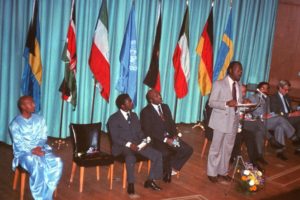
On 20 November 1978, Ambassador Davidson Hepburn of the Bahamas speaks at the fourth observance of the International Day of Thanksgiving, held in the UN Dag Hammarskjöld Auditorium. The programme also celebrated anniversaries of several countries joining the UN, with additional remarks offered by representatives of Equatorial Guinea, the Federal Republic of Germany, the German Democratic Republic, Kenya and Kuwait.
Our capacity is very limited, but our willingness, our eager- ness to be of service to each member, to each ideal of the United Nations, is sincere. No matter what an individual’s post is, whether he holds the highest post or the lowest, he can undoubtedly be an inner flame, if his inner cry is genuine. Each conscious server of the United Nations, irrespective of his nationality or religious and cultural background, is undoubtedly an inner flame. And each flame serves the com- munity of nations according to its capacity and according to its receptivity.
The seeker in us always wants to satisfy the little world and the big world. The world that we claim at the beginning of our life – our home, our parents, our brothers and sisters, our relatives – is the little world. But as our vision increases, as we look around and see a bigger world, an unhorizoned world awaiting us, at that time we claim the big world as our very own.
Each individual who has come to serve the United Nations represents his own country, his small world. But when he becomes part and parcel of the United Nations, the big world, at that time he is for all, for the entire humanity. He started his journey with his own country and then he arrived at the goal of goals: universal oneness.
The United Nations wants to solve all the world’s problems. It is more than eager to solve all the problems that the world could ever imagine. In various ways it is trying to solve the world’s problems lovingly, devotedly, soulfully and unreservedly. A problem indicates confusion, a problem indicates the dance of ego, a problem indicates human weakness. Each problem can be solved and will be solved by only one thing and that is the message of union. This union comes to the fore only when we kindle the inner flame.
A great many individuals think only of the lower reality, the body-reality, as the United Nations building, where thousands of human beings are serving the one cause. The building- reality, the body-reality, of the United Nations immediately captures their minds. But it is the loving souls, the illumining souls of the United Nations that guide the body-reality, or try to guide it. The day will come when the outer world will realise that looming large inside the body-reality is the soul-reality.
Sri Chinmoy, The Seeker’s Mind, 1978 (/sm-4).
17. The Inner Role of the United Nations, Part 2
Sri Chinmoy gave the following talk at the United Nations Office at Geneva on 16 June 1980.
Prayer and meditation are of supreme importance if we are to execute the inner role of the United Nations. Perhaps some of you know that twice a week we pray and meditate at the United Nations in New York. And from time to time I give spiritual talks, soulful talks, which are perfectly in tune with our prayer and meditation.
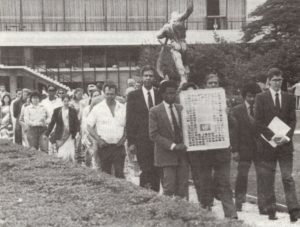
On 25 and 26 June 1985, a Peace Walk in the UN garden marks the 40th anniversary of the signing of the UN Charter, reported in the UN Chronicle, a publication of the UN Department of Public Information (which used the above photo). Participants in the “Peace Walk for United Nations Charter Day” walked silently through the United Nations garden on 25 and 26 June to commemorate the anniversary of the adoption and signing of the United Nations Charter in San Francisco in 1945. Representatives of Member States passed a copy of the Charter’s preamble relay style from one country group to another. The event was organized by the Peace Meditation Group and cosponsored by Antigua and Barbuda, the Bahamas, Cyprus, Malta, Mauritius, Nepal, Samoa, Suriname and Trinidad and Tobago.
The inner role of the United Nations is a shadowless dream, a relentless determination, a breathless promise, a sleepless struggle, a faultless progress, a deathless satisfaction.
The inner role of the United Nations is the link with the immortal power of infinite peace that spans the universe. This is the power that builds, not breaks. This is the power of peace that inundates our inner beings and our outer lives.
This peace is also delight; it evolves slowly, steadily and unerringly towards the great and ultimate destination.
The inner role of the United Nations tells us that duty and responsibility have to be seen in a different light. Each member of the United Nations has a significant duty and responsibility. Here, by virtue of our prayer and meditation, we have come to realise that duty is nothing other than opportunity, and that responsibility is another name for privilege. Therefore, to serve the United Nations unique capacity is to be blessed with a golden opportunity and fruitful privilege.
The inner role of the United Nations tells us success is fleeting, whereas progress is everlasting. It tells us that success on the physical plane, vital plane or mental plane cannot lead us to the final Goal; it is only progress that slowly and unmistakably leads us to our ultimate Goal. The ultimate Goal is not a fixed place; it is always in the process of transcending its own reality.
We have to pray not to conquer but to serve and, while serving, to free the oneness-reality in and around the world. We have to pray not to lead and, again, not to only follow, but to become inseparably one with the comity of nations.
Sri Chinmoy, The Inner Role of the United Nations, 1993 (/ir-20)
18. Peace: The United Nations Soulful Promise
In the United Nations there is a group of genuine seekers who come together two times a week to serve the United Nations with their soulful prayer and meditation. We feel that this inner prayer and meditation can and will help in boundless measure to bring peace, light and bliss to the world. It takes time, but we see that it also takes time for the United Nations to achieve its goals.
Right now, the achievements of the United Nations are far from satisfactory. But we feel that still there is hope. The United Nations is a symbol of man’s inner cry, inner oneness. Outwardly, the members of the United Nations do make mistakes. But even if we make mistakes, that does not mean that we shall never arrive at our goal. No, mistakes are merely rungs in the ladder of our inner progress. So we cannot judge the United Nations on its present achievements. We cannot judge the United Nations by what it has already offered us. We can only judge the United Nations on its soulful promise, its promise that it will one day flood the world with boundless peace.
This world of ours has everything save and except one thing, and that is peace.
Right now fear, doubt, conflict, tension and disharmony are reigning supreme. But there shall come a time when this world of ours will be flooded with peace. Who is going to bring about this radical change? It will be you – you and your brothers and sisters. You and your oneness-heart will spread peace throughout the length and breadth of the world. Peace is unity. Peace is oneness, within and without.
Sri Chinmoy, My Heart’s Salutation to Australia, 1976 (/hsa-26)
19. Inauguration Meditation, 14 April 1970
Sri Chinmoy offered the following illumining words at the inaugural meditation of the Peace Meditation at the United Nations, held on 14 April 1970.
Today’s United Nations was yesterday’s perfecting Vision. Tomorrow’s United Nations is today’s fulfilling Realisation.
Unity is not oneness. A bud is not a flower.
Unity is the temple. Oneness is the shrine.
The absence of unity is imminent confusion.
The absence of oneness is the ultimate destruction.
The presence of unity is the immediate end of human imperfection and limitation.
The presence of oneness is the glorious beginning of man’s perfect Perfection.
Sri Chinmoy, The Garland of Nation-Souls, 1972 (/gns-27)
20. Peace Is Our Birthright. How Can We Have It?
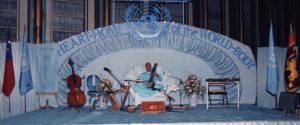
On 8 December 1985, a concert is offered by Sri Chinmoy to celebrate the 40th Anniversary of the UN (1985) and the upcoming UN International Year of Peace (1986), held in the UN General Assembly Hall Lobby. The concert was cosponsored by the Office of the Assistant Secretary-General for the Fortieth Anniversary of the United Nations, as well as by the Permanent Representatives to the UN of Austria, the Bahamas, Cyprus, Fiji, Grenada, India, Malaysia, Panama, Papua New Guinea, Saint Vincent and the Grenadines, Samoa, Sri Lanka, Suriname and Vanuatu.
The outer peace and the inner peace. The outer peace is man’s compromise. The inner peace is man’s fulfilment. The outer peace is man’s satisfaction without being satisfied at all. The inner peace is man’s satisfaction in being totally and supremely fulfilled.
How can we have peace – even an iota of peace, in our outer life, in the hustle and bustle of life and amidst multifarious activities? Easy – we have to choose the inner voice. Easy – we have to control our binding thoughts. Easy – we have to purify our impure emotions. The inner voice is our guide.
The binding thought is the dark and unpredictable weather. We have to face it and then dominate it. The impure emotion is the inner storm. We have to refrain from the luxury of the emotional storm.
How can we choose the inner voice? To choose the inner voice, we have to meditate early in the morning. To control and dominate our undivine thoughts, we have to meditate at noon. To purify our unlit impure emotions, we have to meditate in the evening.
Peace is the beginning of love. Peace is the completion of truth. Peace is the return to the Source.
Sri Chinmoy, The Garland of Nation-Souls, 1972 (/gns-14);
21. Meditation
Since we are seekers, we all need meditation.
Everyone meditates either consciously or unconsciously. There is not a single human being on earth who does not meditate. But most of us are not aware of our meditation. We all want peace of mind. Whatever method we adopt to bring about peace of mind is our way of meditation. We all want happiness. Whatever we do in order to achieve happiness is our way of meditation. We all need love in the inner world and in the outer world, and for that we do various things.
Whatever we do in order to achieve love is our way of meditation.
There are some people who are awakened to some extent. They feel that the desire-life is the life of a beggar and will never be able to satisfy them. From an iota of wealth we try to get more wealth. But unless and until we achieve boundless inner wealth – infinite joy and love – we will never actually be happy. When we realise this, we enter into the life of aspiration. Aspiration deals with infinite peace, light and bliss, which we all have in the inmost recesses of our hearts. If we want to achieve boundless happiness, we can do so only on the strength of our meditation.
Everybody wants freedom. If we can free ourselves from our mind, then we can get the joy, peace, love and fulfilment that at every moment we are looking for. If we can have peace of mind, then we will have everything, for inside peace looms large our complete and perfect satisfaction.
We may study hundreds of books on meditation. We may dis- cuss meditation for hours with our friends. But only meditation-power itself actually can give us peace. Meditation is the art of silencing the mind that tortures us at every moment. If we can meditate soulfully for even a few minutes, then for hours afterwards no uncomely thoughts can attack our mind or disturb its poise and tranquillity. And it is inside the poise of our mind that oneness universal at every moment grows. By virtue of our meditation, our thought-world will be trans- formed into the will-world, and our everyday life unmistakably will be inundated with peace – the peace that grows, the peace that glows, the peace that embraces all mankind.
I meditate so that I can give to the world what my heart has to offer—love and the feeling of oneness.
I meditate because I know that it is by virtue of my meditation that I can get an awakened body, a dynamic vital and a mind totally free from doubt, which is absolute poison to my system. By virtue of my meditation, my fearful and timid heart can be transformed into an indomitable heart.
There are some individuals who think and feel that meditation cannot be applied to all spheres of life. Unfortunately, I do not see eye to eye with them. Meditation has a free access to all spheres of life. There is no activity on earth that cannot benefit from meditation. There are some who are of the opinion that politics and meditation can never go together. I wish to say that they are making a deplorable mistake. Politics and meditation can go together. From one point of view, a politician is a seeker. What does he seek? He seeks peace and joy. Somebody may be working here at the United Nations – in the vortex of politics – but still that individual has the capacity to benefit from meditation.
As a human being, we need success in our outer life and progress in our inner life. The mind gets tremendous satisfaction from the success-life. The heart gets tremendous satisfaction from the progress-life. If we can meditate soulfully every day, then our mind will get considerable peace and our heart will get considerable assurance. On the strength of this inner peace and inner assurance, our mind will succeed in its outer life and our heart will proceed towards its destined goal in the inner life. If each of us can meditate soulfully for just ten minutes early in the morning and again in the evening when the day draws to a close, then before long our life will have a new meaning, a new purpose and a new fulfilling and illu- mining goal.
Sri Chinmoy, The United Nations: The World’s Oneness-Home, 2005 (/un-16)
22. Meditation: Discovery and Invention

On 28 August 1989, the popular singer and Grammy Award winner Addwitiya Roberta Flack joins with her friends, including fellow Grammy winner Narada Michael Walden, for a special concert, “Music for Peace,” held in Conference Room 3 at UN Headquarters. The event also featured Sri Chinmoy on flute and Indian esraj, and was cosponsored by the Peace Meditation Group and the UNSRC Music Appreciation Society.
What is meditation? Meditation is not a prayer of the mind, and it is not a prayer in the mind. But it can easily serve the purpose of a prayer for the mind.
We meditate for various reasons. Peace of mind we all badly need. Therefore, when we meditate, either consciously or unconsciously we aim at peace of mind. Meditation gives us peace of mind without a tranquilliser. And unlike a tranquilliser, the peace of mind that we get from meditation does not fade away. It lasts for good in some corner of the inmost recesses of our aspiring heart.
Meditation is not an escape exercise. The seeker who meditates faces suffering, ignorance and darkness, and inside the very life and breath of suffering he tries to establish the kingdom of wisdom-light.
The true seeker who meditates also knows that whatever he is doing is not for his own personal salvation. Sincere seekers try to assimilate world-truth, world-light and world-capacity and meditate for world transformation, illumination and perfection.
Real meditation never forces us to do something, to say some- thing or to become something, for it knows that everything has to be natural and spontaneous. It only helps us enter cheerfully into the current of spiritual life.
Human life is beset with difficulties, dangers and so forth, but we can overcome these difficulties. We see ahead a perfection-light. But as soon as we see this light that perfects us, we are frustrated. A red traffic light is frustration to us, especially when we are in a hurry to reach our destination. But we forget that it is the red light that saves our precious life from destruction. The red traffic light is regular and punctual. Regularly and punctually it is warning us, saving us. Similarly, regularity in meditation saves us, illumines us and fulfils us.
Silent meditation is the strongest force that can ever be seen, felt and executed. So silent meditation we must learn.
Just by not using outer words, we are not doing silent meditation. Silent meditation is totally different. When we start meditating in silence, right from the beginning we feel the bottom of a sea within us and without. The life of activity and restlessness is on the surface, but deep below, underneath our human life, there is poise and silence. So, either we shall imagine this sea of silence within us or we shall feel that we are nothing but a sea of poise itself.
Sri Chinmoy, The Seeker’s Mind, 1978 (/sm-11)
.
23. Can Meditation Enhance Leadership?
Meditation can and does enhance leadership. But we have to know
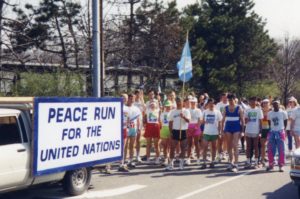
On 7 April 1991, the annual Peace Run for the United Nations, from the early UN site in Lake Success, Long Island to the current New York City Headquarters, draws many enthusiastic participants carrying the UN flag as well as their own national flags. Sponsored by the Peace Meditation Group, the event was first organized in 1985.
what we mean by meditation. If meditation means a secluded life, a life of individuality, then the necessity for lead- ership does not and cannot arise at all. If I alone exist on earth, who am I to lead? I am all in all. Only when there are two persons is leadership necessary or important. Either I take the lead or somebody else takes the lead.
But if meditation means an expansion of our consciousness, if meditation means that we are of all and for all, then our qualities of leadership are bound to increase.
In mental leadership we notice that the world around us is all imperfection and we feel that only our own mental world is perfect.
There is another type of leadership. We call it psychic leader- ship, the leadership of the heart. Whoever leads in the heart is a real leader. This leadership is the recognition of one’s inseparable oneness with the rest of humanity. The one is for the many and the many are for the one. Here real oneness makes us feel that all are equally responsible for embodying the highest Truth, revealing the highest Truth and manifesting the highest Truth.
Meditation is a dynamic active power; it is movement. Movement itself is progress. Movement itself is the growth and expansion of our reality. Whenever we meditate, at that time we are moving toward some destination which we are bound to reach. While progressing toward the destination, this movement increases its potentiality, its capacity, its reality, its vision.
In the outer world, a leader is he who has more capacity or more opportunity than other individuals or many other individuals. But in the spiritual life it is not like that. If one can accept the reality around him as his very own despite all its imperfection, limitation and bondage, then he is the real leader – and not he who has a little more capacity than another individual or the rest of the group. He who claims his brothers and sisters as his very own, he who accepts the challenge of ignorance and who stands in front of ignorance-night determined to conquer it and transform it into the flood of Light – he is the real leader.
If one has not come into the world with a quality of leader- ship, it does not mean that that person will never have leadership. No! If one accepts the spiritual life, it means one is beginning a new life. A new life means a new hope, a new promise, a new prophesy, a new dream which is about to be blossomed into reality. This new life is bound to offer the seeker what he wants, whether it be leadership or anything else.
The capacity for leadership is not the sole monopoly of any individual. It is granted to all. But each individual has to be aware that this capacity and reality abide in him.
Sri Chinmoy, Union-Vision, 1975 (/uv-5)
24. Mediation and Meditation
Two conflicting parties need to reach a compromise. A third party, the mediator, is then of paramount importance. His is the task of offering light to the conflicting and strangling par- ties. When the mediator is successful, the two conflicting par- ties end their mutual enmity and hostility. They live, or at least try to live, peacefully, in their own domain.
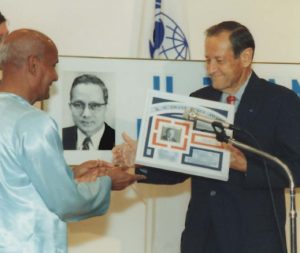
On 20 September 1994, UNICEF Executive Director James Grant receives the U Thant Peace Award from Sri Chinmoy at an Interfaith Prayer Break- fast held at UNICEF House, New York in honour of the UN International Day of Peace. Noting the spirit of the event and the presentation, Mr. Grant commented, “That in particular is why I am appreciative of receiving this U Thant Peace Award from such treasured hands [Sri Chinmoy] and from such a treasured Group.” Hosted by Ambassador Jacques Louis Boisson of Monaco, the event was cosponsored by the Peace Meditation Group in cooperation with the Permanent Missions of Bangladesh, Bulgaria, Grenada, Moldova, Namibia, Nepal, Sri Lanka and Yugoslavia. The U Thant Peace Award was established in 1982 by the Peace Meditation Group to perpetuate the memory of the third Secretary-General, who invited Sri Chinmoy in 1970 to conduct twice-weekly peace meditations for delegates and staff at UN Headquarters in New York.
Here on earth, since everything is fleeting, if we can derive a little joy, a little peace, a little harmony from mediation, our mental wisdom, we should be proud of our achievement. At a certain stage in human development, when most of the people are not aspiring to be perfect, mediation is of great importance. Therefore we must pay attention, reverential attention, to mediation. It is a temporary mental relief, a pause, a rest in the life of constant conflict. It is a clever com- promise. But to expect abiding peace and illumining fulfilment from mediation is simply absurd. For these higher goals we need meditation.
The United Nations is the mediator unmatched and unparalleled in today’s world.
Its achievements are unique. Unfortunately these achievements may not, or do not or cannot last.
In the inner life, we also see two conflicting parties: fear and doubt on one side; and inner courage and faith on the other side. Meditation plays three distinctive roles in the inner life. Meditation is the medicine; meditation is the doctor; meditation is the cure, the ultimate cure. Meditation cures our fear.
It transforms our fear into strength, adamantine will. It trans- forms our doubt into constant, unmistakable and inevitable certainty. He who is surcharged with inner courage and faith will get constant help and illumination from meditation.
In the outer world of turmoil, mediation is necessary. In the inner world of frustration and despair, meditation is necessary. If we can bring the result of meditation to the fore, mediation will have a new life that will be flooded with ever- lasting peace, light and bliss. In the fleeting, in the finite, we shall hear the message of the eternal and the infinite.
Sri Chinmoy, The Garland of Nation-Souls, 1972 (/gns-17)
25. Does Meditation Really Accomplish Anything?
Meditation is inner movement and outer progress. Meditation is soulful promise and fruitful manifestation.
A man of sterling aspiration will confidently ask, “… Is there anything that cannot be achieved by meditation?”
What is the first and foremost thing we expect from meditation? Peace. Peace and nothing else. Meditation is the embodiment of peace. The present-day world needs only one thing: peace.
The peace-lover, former Secretary-General Dag Hammarskjöld, offers us a sublime message: “No peace which is not peace for all.” In peace, what looms large is eternal, fulfilling rest. He says, “. . . no rest until all has been fulfilled.”
Why do we meditate? We meditate just because our life needs inspiration, our life needs aspiration. Aspiration is, to some extent, a form of meditation. It is our meditation that promises to give us our realisation-tree. Today meditation plays the role of aspiration and tomorrow meditation will play the role of realisation. In our human life two things are of paramount importance: role and goal. At every moment we have to know what our role is, and then we have to be conscious of our ultimate Goal. At our journey’s start we have to be fully aware of our role. At the end of our journey’s close we have to be fully conscious of our Goal. Now, there must needs be a connecting link between our role and our Goal. Meditation is this connecting link.
Meditation, in fact, accomplishes everything.
Sri Chinmoy, The Garland of Nation-Souls, 1972 (/gns-12)
26. Experiencing Concentration and Meditation
Concentration and meditation are of utmost importance in the spiritual life. Therefore, let us try to concentrate and meditate. First we shall concentrate.
I have offered to each of you a flower. Try to look at the entire flower for a few seconds. While you are looking at the entire flower, please feel that you are the flower and also that this flower is growing inside the inmost recesses of your heart.
You are the flower and, at the same time, you are growing inside your own heart. Then gradually try to concentrate on one particular petal, any petal that you select. Feel that the petal is the seed-form of your reality-existence. After a few minutes’ time, concentrate again on the entire flower, and feel that this flower is the universal reality. In this way go back and forth. Keep your eyes half open and do not allow any thought to enter into your mind. Try to make your mind absolutely calm, quiet and tranquil.
Now close your eyes and try to see the flower that you have concentrated upon inside your heart. Then, in the same way you did with your eyes open, concentrate on the flower inside your heart with your eyes closed.
Now we shall meditate. Keep your eyes half open and imagine the vast sky. Either try to see or feel the vast sky right in front of you. In the beginning, try to feel that the sky is in front of you; then later, try to feel that you are as vast as the sky, or that you are the vast sky itself.
Now close your eyes and feel that you are the universal heart. Try to see and feel the vast sky inside your heart. You are the universal heart, and inside you is the sky that you meditated upon and identified yourself with. The universal heart is infinitely, infinitely vaster than the sky, so you can easily house the sky within yourself.
Sri Chinmoy, Reality-Dream, 1976 (/rd-14)
)
27. The Voice of Silence
No matter how long I speak about the Voice of Silence, I shall not be able to make you hear the Voice of Silence. But I wish to assure you that if you meditate with me for a few minutes before I speak, if you can dive deep within as I shall dive deep within for a few minutes, then either you will hear the Voice of Silence or your prayer and meditation will expedite your journey towards receiving the message of Silence. (A short period of meditation followed.)
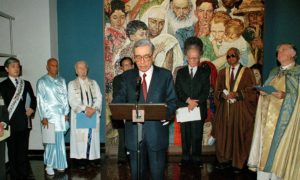
On 21 November 1996, UN Secretary-General Boutros Boutros-Ghali offers remarks at an Interfaith presentation of the 1996 Declaration of World Thanksgiving. Sri Chinmoy (second from left) joins interfaith leaders in reading from the Declaration during the ceremony, which took place in front of the Norman Rockwell “Golden Rule” mosaic at UN Headquarters. Inscribed with “Do unto others as you would have them do unto you”, the mosaic was a gift from the United States for the 40th anniversary of the UN in 1985, made possible by the Thanks-Giving Foundation. – (UN7691912 UN Photo/Ron da Silva)
It is true that it takes years for a seeker to hear the message of the Voice of Silence. But, I wish to say that on the strength of our inner aspiration and outer dedication, we can and will hear the Voice of Silence which sempiternally is guiding our life.
We wish to hear the Voice of Silence, but how can we hear it? There are two principal ways. One way is to silence the human mind totally.
The other way is to feel that the heart-vessel has to be filled with peace, light, bliss and power. When we want to hear the Voice of Silence through the mind, we empty the mind. But when we want to hear the Voice of Silence through the heart, we fill up the heart.
What else must we do to hear the Voice of Silence? When we pray, when we meditate, we have to do something quite specific. When we breathe in, we have to imagine consciously that inside that breath, within us, is a peaceful nest and a bird. After a few minutes we have to feel that the nest is our outer existence and the bird is our inner existence. Now this bird has to come out of its nest. How do we bring the bird out of the nest? One way is to make our concentration, meditation and contemplation as dynamic as possible. Here, dynamism means the constant feeling within you of a speeding train that does not stop – an express train that does not stop at any station or at any junction. It is a tireless train, an endless train, continuously going on. In the flow of dynamism, we see the bird of our inner being leaving its nest.
Another way to hear the Voice of Silence is to feel, the moment you enter into your meditation or start praying, that you are an infinite expanse of ocean. A few minutes later, please feel that you are deep inside the ocean, and from there try to spread the wings of the bird that you were when you followed the dynamic way of hearing the message of Silence.
A seeker may hear the Voice of Silence as something very faint and feeble – a tiny voice like a ripple of calm water. But this feeble voice, this faint voice, can be compared to an atom. When we split the atom, we release unbelievable power. Similarly, when we know how to hear the Voice of Silence properly, our inner being immediately is inundated with the power of thousands of inner suns.
How can we know whether we are hearing the Voice of Silence or something totally different which we are mistakenly calling the Voice of Silence? When we hear a voice from the very depths, from the inmost recesses of our heart, and if that voice gives us a message which our outer mind or physical consciousness is ready to accept with utmost joy and love, then we will know that that is the Voice of Silence. If the physical mind or the outer consciousness does not get immediate joy, then it is not the Voice of Silence. When the Voice of Silence is heard, the outer mind will accept it so wholeheartedly that it will feel that the lofty truth it has discovered is its own achievement.
Sri Chinmoy, The Tears of Nation-Hearts, 1974 (/tnh-19)
28. The Inner Call
For those who are sincere, the inner call is always illumination.
The forces of aspiration tell us that only a new life, a new nourishment, can give us happiness and satisfaction.
Always the call will come to each individual on a different plane. It can come on the political plane, on the spiritual plane, or on any other plane. When we hear that call, we have to know how far we should go with it. Some people want only to start their journey, while others want to walk a consider- able distance and still others want to reach the destination.
There will be a few who will want to come back to the starting point again to teach others how to walk properly and how to reach the goal.
When we get an inner call, no matter where we are, we have to go forward.
The United Nations also has an inner call. That inner call does not come from the geography of the world or the history of the world; it comes from the cry, the inner cry of the world. The living inner cry says that the role of the United Nations is to serve, not men as such, not the world as such, but the cry that is inside the world, the cry that is inside each human being, inside each individual on earth.
An inner call comes to awaken us, to illumine us. If it is from the inner call that we make a choice, then it is from the inner call that we move forward, and it is from the inner call that we eventually realise the Highest. Everything must be illumined and perfected. This happens only when we do not turn back. The road is a one-way road.
Sri Chinmoy, Reality-Dream, 1976 (/rd-20)
29. Self-Giving and Happiness
A seeker can be someone who sees something that he does not have right now. He wants something that will give him joy and satisfaction in life, but he does not have that very thing.
In order to become proficient in a particular profession, deep inside us we have to have an inner cry. We want to do some- thing, to grow into something, to become something. This means we are seekers. In your case, this seeking eventually bore fruit and you have now become men and women of profession.
Each profession is like a quality that we offer to the world at large, a quality that satisfies and fulfils us. We have a human family and one member is a doctor, another is a professor, a third is a lawyer and a fourth can be something else. All feel an illumining and fulfilling bond among them. Each one playing that role brings peace, light and delight into the family. The help of each one is of paramount importance.
Each capacity offers us happiness. If someone is endowed with a special capacity, that means he has happiness and this happiness makes him go forward.
As individuals, we are not perfectly happy, in spite of having capacity in one particular field. We can be happy only if we believe in the theory of change. We have to change ourselves. We have to change what we have and what we are in order to make progress.
What do we have? We have the physical body, the vital, the mind and the heart. The body is right now unconscious. The vital is aggressive. The mind is doubtful. The heart is inscure. Again, this can all be changed, transformed. When we cry like a child, in silence, and our prayer is sanctioned, we get a conscious body, a dynamic vital, a believing mind and a secure heart.
We want happiness – happiness from life and happiness in life and we want to offer this happiness to our near and dear In order to achieve happiness in life, we have to give unreservedly what we have and what we are.
We feel that everything in life disappoints us and deserts us with the exception of truth. To live in truth is to live in happiness. There are various ways to achieve this truth. But only one way is most effective and that way is the way of self- giving – unreserved and unconditional self-giving to our own extended, expanded, enlarged, boundless, unlimited existence.
Each profession is a branch of the life-tree. And again, each profession knows that there is a root to the capacity-tree. We have to live in the root and this root is happiness. We can live in the root only by self-giving: giving what we have and what we are. What we have is love and what we are is oneness. By offering love in any form to mankind – to our so-called superiors and so-called inferiors, or to our brothers and sisters of the world – we come to know what we ultimately and eternally are: oneness inseparable.
Sri Chinmoy, Reality-Dream, 1976 (/rd-4)
30. The Right to Happiness: A Human Right?
Happiness is something that feeds our heart, inspires our mind, energises our vital and illumines our body.
When the heart is happy it embraces the whole world. When the mind is happy it accepts the world as its very own. When the vital is happy it offers its very existence to the world. And when the body is happy it serves the world the way the world wants to be served.
In the domain of lifeless hope, happiness is theoretical and fruitless. In the sea of selfless love, happiness is practical and fruitful.
The life of happiness is aspiration. The soul of happiness is realisation. The goal of happiness is perfection.
Is the right to happiness a human right? Without the least possible hesitation, I venture to answer this question in the affirmative.
Sri Chinmoy, The Garland of Nation-Souls, 1972 (/gns-23)
31. Spirituality: The Fount of World Peace
World peace will begin when human expectation ends.
World peace can come into existence when each individual and each nation consciously feel that other human beings and other nations do not depend on them. No nation is indispensable. But if one nation helps another devotedly and unconditionally, then the world will be inundated with fulfilling peace.
Spirituality is the fulfilment of all responsibility. To love the world is our responsibility. To please the world is our responsibility. We know our own teeming responsibilities; but when we think of the world, unfortunately we do not think of it in a proper way. The world immediately misunderstands us, and we find it impossible to have an inner connection with the world.
To love the world is our responsibility. We try to possess and bind the world, and while we are doing this, we see that we have already been bound and possessed by the world.
We want to please the world, but how can we please the world if we are not pleased with our own lives? It is sheer absurdity to try to please others if we are not pleased with our inner and outer existence. We try to please others with our words. If we have no aspiration, how can we offer the world peace, joy and love? How can we offer anything divine when we don’t practise what we preach? Spirituality offers us the capacity to practise what we preach.
We try to please the world, but the world doesn’t want to be pleased. It is as if the world has taken a vow that it won’t allow itself to be pleased.
World peace can be achieved, revealed, offered and manifested on earth when the power of love replaces the love of power.
Sri Chinmoy, The Garland of Nation-Souls, 1972 (/gns-16)
32 Spirituality: The Union of Vision and Aspiration
When we try to judge others or examine others, we immediately lose our sense of identification. But if we focus our attention on all things with the same amount of sympathy, love and concern, we feel inside all things their basic oneness.
The first thing we have to do in our life is pray and meditate. Then we try to offer the light that we have received from our prayer and meditation to the world around us. First we achieve and then we give. If I do not have any light, then what am I going to give?
If we feel the world around us can never be transformed, then we are mistaken. This attitude is unhealthy, abnormal. We have to accept the world around us as our very own.
We have to feel that the members of society are like the limbs of our body. If even one part of our being is not transformed, then we are not perfect. We have to strike a balance. Spirit will give us realisation, but matter will offer us the message of manifestation. We have to try to combine the messages of spirit and matter.
Sri Chinmoy, The Tears of Nation-Hearts, 1974 (/tnh-25)
33. Is the Spiritual Life an Escape from Reality?
The spiritual life is never an escape from reality. The spiritual life is the conscious and spontaneous acceptance of reality in its totality. For a spiritual seeker the idea of an escape from reality is absurdity plus impossibility, for spirituality and reality need each other to be supremely fulfilled. Without spirituality’s breath, reality is more than meaningless.
Acceptance of life is the assurance of faith. Faith walks along the road of fulfilling and fulfilled immortality. Escape from reality will, in the twinkling of an eye, weaken our resolve, and throw us into the very depths of the annihilation-sea.
No, we must never make a cowardly escape. We must always be brave. Divine courage is our birthright. We are chosen to fight against the teeming, brooding and threatening igno- rance-night.
Sri Chinmoy, The Garland of Nation-Souls, 1972 (/gns-11)
34. Transcendence and Immanence
The past is important. The future is more important. The present is most important. The present is infinitely more important than the past and the future put together.
The past is a promise, an unfulfilled promise. The future is a hope, an uncertain hope. The present is necessity’s reality and reality’s necessity. The present is the eternal Now.
Transcendence and immanence, vision and reality are inseparable and invaluable. When we want to become members of the world of vision-dream, transcendence is invaluable. When we want to become members of the world of reality-manifestation, immanence is invaluable.
Transcendence is the seed. Immanence is the fruit. A seed is no seed if it does not reveal the fruit. A fruit is no fruit if it does not embody the seed. The seed and the fruit are at once inseparable and invaluable.
Sri Chinmoy, Union-Vision, 1975 (/uv-6)
35. Beyond the World of Reason
There are two types of mind: the human, or physical, mind and the spiritual mind. The physical mind is enmeshed in the gross physical consciousness; therefore, it does not and cannot see the proper truth in its own world. The spiritual mind, which is the illumined or illumining mind, has the capacity to stay in the aspiring heart; therefore, it sees the higher truth, the truth of the ever-transcending Beyond, and aspires to grow into this truth.
The human mind wants to achieve the vastness of the infinite, and at the same time it is afraid of infinity. The human mind is searching for truth, for light, for reality. But unfortunately, it wants to see the highest truth in its own limited way. It does not want to transcend itself in order to reach the ultimate truth.
The aspiring inner heart, the psychic heart, knows what it is and what it stands for. It knows that its ultimate realisation lies only in its inseparable identification and oneness with infinity. The heart knows that even though it is like a tiny drop, when it enters into the mighty ocean it will not lose its identity and personality. On the contrary, its personality and individuality will increase in boundless measure and it will be able to claim the vastness of the sea as its very own. The spiritual mind, in the process of its own inner illumination, wants to go far, far beyond the domain of reason in order to see, feel and grow into the ultimate, transcendental Truth.
The paramount importance of the human mind has, until now, been undeniable. The human mind separated us from the animal kingdom through the process of cosmic evolution. Had there been no awakening of the human mind, the conscious human life could not have blossomed out of the animal kingdom.
The transformation of the physical, the mind and the heart is taking place every second in each human being. But when a human being consciously aspires, his transformation is quick, convincing and, at the same time, most fulfilling. Therefore, those who pray and meditate are the pioneers in the world of supreme truth, light and delight.
Beyond the world of reason, the light that we see, feel and want to grow into is the light of illumination. It is not the light that wants to expose our earthly weaknesses. The Upanishads mention that there, in the world beyond reason, the sun shines not. This does not mean that this realm is full of darkness and chaos. No, there the star-sun shines not, because that world is self-effulgent. There the inner light, the higher light, reigns supreme. Seekers of the ultimate truth eventually enter into that world.
When a seeker can establish a free access to that particular world, his heart sings: “No mind, no form, I only exist…” [Sri Chinmoy, My Flute, “The Absolute”. New York: Agni Press, 1972.]
This ‘I’ is not the earthbound ‘I’, the ego. This ‘I’ is the universal self, which is birthless and deathless.
Sri Chinmoy, The Tears of Nation-Hearts, 1974 (/tnh-18)
36. The Past, the Present and the Golden Future
No matter how sweet, how loving, how fulfilling was the past, it cannot give us anything now that we do not already have.
We are moving forward towards the goal. The seed grows into a plant and then it becomes a huge tree. If the seed remains a seed, then there will be no further manifestation. True, we shall remain grateful to the seed because it enabled the plant to grow. But we shall no longer pay much attention to the seed stage. Similarly, once we have become a plant in our life of aspiration, let our aim be to become a tree. Always we have to look forward towards the ultimate Goal. Only when we become the tallest tree will our full satisfaction dawn.
We must always remain in the present. The present is constantly ready to bring the golden future into our heart. Today’s achievement is most satisfactory, but we have to feel that today’s achievement is nothing in comparison to what tomorrow’s achievement will be to the new satisfaction that is about to dawn. We have to feel that every second brings new life, new growth, new opportunity. If we are ready to allow change into our life every second, every minute, every day, we are bound to grow. How will we know that this change is for the better and not for the worse? We will know it is for the better if we see that new light is entering into us. If new light is not entering into us, then we have to feel that we are doing something wrong or making some mistake, unconsciously if not consciously.
Sri Chinmoy, The Tears of Nation-Hearts, 1974 (/tnh-11)
37. How Secure Are We?
Security is the endless smile of our inner self-confidence. Self-confidence is our infinite achievement in the gradual process of our self-transcendence.
Why are we insecure? We are insecure precisely because we do not claim vastness as our birthright. We are insecure because we do not claim oneness as our soul-right. In our outer life, the power of ignorance wants to offer us its security, which is nothing short of absurdity. In our inner life, the power of light wants to offer us its security. Only the power of light can offer us satisfaction and perfection.
Security does not lie in our material achievements. Security does not lie in our earthly possessions. The richest man on earth is not secure. His constant anxiety about maintaining and increasing his wealth makes him more insecure than the poorest man on earth. A king, a president or dictator is not secure. His hunger for sovereign power in ever-increasing measure and his fear of losing the power he has do not allow him to be secure. He is more insecure than the most insignificant human being on earth.
As an individual cannot be secure by amassing material wealth and by acquiring heights of power, even so a nation cannot be secure by displaying geographical boundaries and by declaring historical achievements. Money-power is no security. Expan38. sion-power is no security. Possession-power is no security. It is the soul-power that is all security. And our love-power, which has free access to the soul-power, is always at our disposal.
Inseparable oneness we can achieve, grow into and become only on the strength of our love. Love is oneness. Oneness is the universal life. Self-giving is all security.
Sri Chinmoy, The Tears of Nation-Hearts, 1974 (/tnh-16)
38. Simplicity, Sincerity and Purity
All we need is simplicity. A child is simple; therefore everybody loves the child. All we need is sincerity. A child is sincere; therefore everybody loves the child. All we need is purity. A child is pure; therefore everybody loves the child.
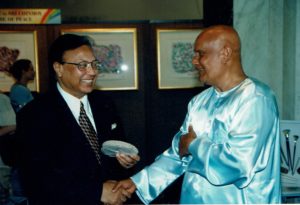
On 29 August 2001, Ambassador Anwarul K. Chowdhury of Bangladesh hosts a reception for Sri Chinmoy’s “Paintings for Peace” exhibition, dedicated to the International Decade for a Culture of Peace and Non-Violence for the Children of the World, 2001-2010. The artwork was on display in the UN Secretariat Lobby from 20 to 31 August. For the occasion of the 50th anniversary of the Peace Meditation Group, Ambassador Chowdhury commented: “Through my work advocating for the Culture of Peace and Sri Chinmoy’s efforts to foster inner and outer peace through his meditations at the United Nations over the years, we became close friends. The universal nature of his philosophy embraced and encouraged people of all backgrounds, faiths and nationalities to work together for peace. Which other place can be more appropriate to embed this philosophy than the United Nations with peace at the centre of its agenda undertaken by people from all parts of the world? I share with Sri Chinmoy his vision of a ‘oneness world of peace’ within each individual and for humanity as a whole.” (27 August 2019)
Simplicity, sincerity and purity. On the one hand, these three things we are able to use at any moment in our day-to-day life. On the other hand, they are the most difficult things that we have to achieve.
Each human being – no matter how old he is, how mature he is, how developed he is, how intelligent he is – if he wants to have an iota of peace, abiding peace, then he must needs have simplicity, sincerity and purity.
There are people who are of the opinion that simplicity is almost tantamount to stupidity. But I wish to say that simplicity and stupidity are like North Pole and South Pole. One can be as simple as a child and, at the same time, one can have boundless knowledge, light and wisdom. The great philosopher Socrates is a striking example. He was at once simplicity and wisdom.
Each human being wants satisfaction. Satisfaction in life can come only by acquiring some knowledge, more knowledge, abundant knowledge, infinite knowledge. In order to achieve infinite knowledge, we have to become students. Socrates said, “I would like to be an eternal student.” A child is a student. A child feels at every moment that he has something new to learn and to become. A child grows; he opens his heart’s door to the world-knowledge. And each time he learns something he feels there is something more he has to learn. A new sun has to dawn in his life.
All those who are working at the United Nations or working for the United Nations are serving the United Nations individually and collectively according to their capacities. But if we want to increase this capacity, either in the physical world, the vital world, the mental world or the psychic world, then we all have to feel that we are students.
Then will the dreams that we treasure for our own countries soon be fulfilled.
Simplicity, sincerity, purity: right now they are our most faithful, devoted instruments which will help us reach the ultimate Goal.
Sri Chinmoy, Union-Vision, 1975 (/uv-8)
39. The Face of Truth
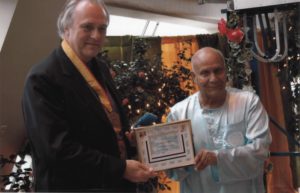
On 21 November 2005, Sri Chinmoy presents a plaque to Mark Malloch Brown, then Chef de Cabinet of the UN Secretary-General, in a “Lifting Up the World with a Oneness-Heart” ceremony held at the UN Millennium Hotel, across from the UN Secretariat Building. Later when he was UN Deputy Secretary-General, at a meeting in his 38th floor office on 13 November 2006, he told Sri Chinmoy, “For so many colleagues and friends at the UN, you have been a compass and a guiding light.”
After Sri Chinmoy’s passing in October 2007, Lord Malloch Brown commented, “Sri Chinmoy never lost faith in the UN and those who worked in it. He brought courage and support to so many individuals in our organisation but also his voice and prayer to those who led it. A man of the spiritual life, he understood the need for the UN in the material world if the two were ever to find justice and harmony.”
On the occasion of the 50th anniversary of the Peace Meditation Group, Lord Malloch Brown wrote on 18 May 2020, “Sri Chinmoy was part of the spiritual fabric of the UN and its New York home. His meditations, and the followers he drew to them, united people of different backgrounds and experiences and brought them comfort and hope as well as shared purpose and community.”
A seeker wishes to see the face of truth in spirituality, in religion, in love, in brotherhood, in every field of reality, in every branch of the reality-tree. But the face of truth is found only in the longing for truth. The very heart of truth is to be found only in the longing itself. Truth is the longing, the birthless and deathless longing which we have and which we are.
Some seekers are of the opinion that truth is not to be found here on earth, that truth belongs to the hoary past, that it is a memory of the past which we are carrying and dragging. But this is not true. Truth was there before, truth is here now and truth will also be present in the future.
Truth needs a possessor, a revealer and a fulfiller. The truth- possessor is he who is at least a few centuries in advance of his time. The truth-revealer is he who stands in front of humanity, facing humanity. He enters into humanity’s count- less needs and transforms humanity’s needs into deeds. The truth-fulfiller is he who lives only for humanity, for humanity’s sake.
Here we are all seekers of the United Nations, for the United Nations. The United Nations itself is both the seeker and the truth. When we look at the body-reality of the United Nations, we see that the United Nations plays the role of the seeker. But when we look at the soul-reality of the United Nations, then we see that the United Nations is nothing short of truth and light and delight.
The seeker in the United Nations is becoming and growing into the truth-reality, and the truth-reality is constantly unveiling its hidden treasures – its immortalising, all-illumining and all-fulfilling treasures. These treasures are concern, sympathy, union, oneness, justice-light, perfection and, finally, satisfaction in all that the United Nations does and all that the United Nations is going to do. The United Nations is growing into the perfection-tree that will offer its branches of concern, sympathy and oneness to humanity.
Sri Chinmoy, The Seeker’s Mind, 1978 (/sm-5)
40. The Court of Divine Justice
The human justice wishes to offer me protection. The divine justice offers me protection, illumination and perfection. The human justice is fairness. The human justice is a threatening force. The human justice is a binding law. The divine justice is love. The divine justice is self-giving. The divine justice is fulfilling.
Here on earth we see that liberty and justice are two different things. If one enjoys liberty, we feel that person has violated the laws of justice. He is acting like a wild elephant. But if one cares only for justice, then we feel that his life has no warmth, there is no feeling of enthusiasm. This is all on the human level.
Only he who has inner liberty can hear the message of divine justice. Only he who has known what the divine justice is can be free and independent. Liberty and justice in the inner world are inseparable.
When a nation is not awakened, when a nation is unaspiring, unillumined, it feels that might is right. This is human justice. But when a nation is illumined, all-loving and all-embracing, it feels that right is might. It feels that justice lies only in the divine right.
The divine justice is ready at every moment to be of help to us, to inspire us, guide us, mould us and shape us. But we are equally afraid of the divine justice and the human justice.
When we do something wrong, we feel that we will be exposed. This is true in the case of human justice. But the divine justice will never, never expose us.
The divine justice is the breath of reality. In the human court we see all kinds of crime but in the Court of Divine Justice we notice only one crime every day, and that is human ungratefulness. Here the punishment is forgiveness.
Sri Chinmoy, The Garland of Nation-Souls, 1972 (/gns-20)
41. The Song Universal
The following excerpts are from Sri Chinmoy’s first talk to members of the United Nations community, “The Song Universal,” given on 26 November 1968 at the Church Center for the United Nations.
The Song Universal is freedom. Freedom from what? Freedom from limitations, freedom from imperfections and freedom from ignorance. Man is in stark bondage. Nevertheless, man has the power deep within to cut asunder the teeming ties that have bound him and forced him to launch into the sea of uncertainty.
Freedom does not mean being away from home. Freedom means accepting and feeling the entire world as one’s real home, as one’s very own.
The word “United” is hallowed. It can better be felt than described. Rather I should say it can only be felt and cannot be described at all. “United we stand, divided we fall.” We are fully aware of this maxim. What we need is to live it.
Our inner realisation and outer action must run abreast. Our outer achievements should be the conscious and spontaneous revelation of our inner divinity.
Love, harmony, peace and oneness are ideals. On the strength of his inner mounting flame of aspiration, man can easily and spontaneously manifest these ideals in every sphere of life.
It is quite natural and proper that we should discover our God in and through our own religion. When we go deep within, we come to realise that there is only one religion, and that religion is man’s inmost cry for realisation.
Sri Chinmoy, The Garland of Nation-Souls, 1972 (/gns-4)
42. Human Art, Divine Art, Supreme Art
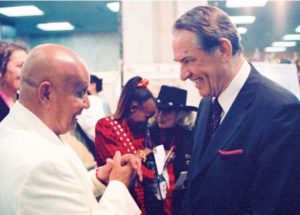
On 3 April 2006, at the opening reception of an exhibition in the UN Secretariat Lobby of Sri Chinmoy’s “Paintings for World Harmony”, the artist greets Jan Eliasson, President of the 60th session of the UN General Assembly (and later UN Deputy Secretary-General, 2012-2016).
After receiving an award from Sri Chinmoy on 17 May 2006, Jan Eliasson said, “You have played an important role already, and you are going to play an important role because the values for which you stand and the message for which you stand are timeless and will go beyond the present….I want to pay my respects to you and assure you that your message is extremely powerful and that it will continue to last in this world. We need this message. We need to work for peace. We need to work for development, and we need to work for a life in dignity for all.”
First see it and then draw it: this is human art. First feel it and then draw it: this is divine art. First live in the inner world with your capacity-light and then live for the outer world’s necessity-life: this is supreme art.
Calculation of earth’s beauty is human art. Liberation of earth’s beauty is divine art. Perfection of earth’s beauty is supreme art.
Human art declares, “Nothing succeeds like success.” Divine art affirms, “Nothing proceeds like progress.” Supreme art whispers, “Nothing satisfies like service, soulful service.”
The lofty height of human art is the inspiration-moon. The sublime depth of divine art is the aspiration-sun. The illumining goal of supreme art is eternity’s perfection-day.
Human art is the leaf-experience of our life-tree. Divine art is the flower-realisation of our life-tree. Supreme art is the fruit- perfection of our life-tree.
A leaf inspires us: therefore, we run towards our destination. A flower purifies us; therefore, our speed becomes tremendous and we run fast, faster, fastest. A fruit energises us; therefore, we become instruments to fight against ignorance, and finally, to establish in ourselves the real, the eternal silence-life and eternal perfection-beauty.
Sri Chinmoy, Union-Vision, 1975 (/uv-23)
43. The Divine Mission
The outer love is constant sacrifice. The inner love is inseparable oneness.
At the United Nations there are many missions representing different countries. Each mission is like a river flowing into the ocean, and the ocean is the United Nations. Each mission is a flowing river entering into the ocean with hope, with eagerness and with a willingness to become part and parcel of the ocean.
It is the constant flow of the rivers entering into the ocean that makes the ocean a living reality. And when the ocean flows back into the rivers, it offers them its abundant inner wealth so they can fulfil themselves through it.
The United Nations is the body and each mission is like a limb. The body is perfect only when all the limbs are perfect. If one limb remains imperfect, the body remains imperfect.
The mission of the great is to become one with those who are less great than they, and to lift them up to a higher standard through self-giving. The mission of those who are not yet great is to feel that the great ones are only the more evolved extensions of their own aspiring consciousness.
Sri Chinmoy, The Tears of Nation-Hearts, 1974 (/tnh-8)
44. United Nations Day
On 24 October 1978, the Peace Meditation at the United Nations observed United Nations Day with a programme in the Dag Hammarskjöld Auditorium. Sri Chinmoy made the following remarks on that occasion.
What does United Nations Day signify? It signifies a day of universal hope, a day of universal promise, a day of universal peace and a day of universal oneness. Hope brightens humanity’s present deplorable fate. Promise encourages humanity’s speed, which embodies success and progress.
Peace enlightens humanity’s age-old ignorance. And satisfaction, which is founded upon oneness, the oneness that we long for in our world family, will one day dawn in our aspiring heart and our dedicated life.
The United Nations is not a mere building, it is not a mere concept, it is not wishful thinking or even a dream. It is a reality which is growing, glowing and manifesting its radiance here, there, all-where, throughout the length and breadth of the world.
Sri Chinmoy, The Inner Role of the United Nations, 1993 (/ir-8)
45. On a Birthday
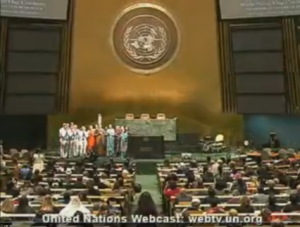
On 4 February 2013, the Peace Meditation Choir performs Sri Chinmoy’s songs for peace in the UN General Assembly Hall, to open a programme entitled “United for a Culture of Peace through Interfaith Harmony.” Organized by the Office of the President of the 67th session of the UN General Assembly, in cooperation with UNESCO and the Committee of Religious NGOs at the UN, the event marked UN World Interfaith Harmony Week, and was webcast on UN Web TV. To see the Choir’s performance, please visit: http://webtv.un.org/watch/united-for-a-culture-of-peace-through-interfaith- harmony/2165451739001
Each birthday is a new awakening. Each birthday is a new hope. Each birthday is a new promise. Each birthday is a new fulfilment.
The new awakening takes place in our earth-bound consciousness. The new promise challenges the doubtful mind and reminds the mind of its origin: consciousness-flood. The new fulfilment occurs inside the entire being.
The soul promises the earth-consciousness that it will help it achieve peace, light, love, delight, joy, harmony and every- thing that the earth-consciousness needs.
Each birthday is a tune, a melody of the universal music. Each individual is also a melody of the universal music. The seeker grows and glows in this music, which he can hear with his soulful ears.
A thought indicates a new birthday. An iota of will indicates a new birthday. An upward movement indicates a new birthday. On a birthday we feel our inseparable oneness with the expansion of a new light, a light that will ultimately cover the length and breadth of the world.
The real birthday does not come only once a year. The real birthday is the birth of each second in a seeker’s life. An aspiring second in the seeker’s heart is the real birthday.
Sri Chinmoy, Reality-Dream, 1976 (/rd-21);
Sri Chinmoy, United Nations Meditation-Flowers and Tomorrow’s Noon, 1978 (/unm-24)
46. Humanity’s Promise
Each individual has made an inner promise to humanity. Again, humanity also has made an inner promise to each individual. Each individual, when he prays and meditates and enters into his highest transcendental Height, looks around and sees countless beings around him. At that time he feels it is his bounden duty to carry all human beings, all his brothers and sisters, to the highest Height. This is his promise.
And humanity, as a collective soul, promises to each individual that it will offer universal light and delight. The vision and reality have to embrace the entire creation. Length and breadth as well as height are equally needed. The individual will carry the collective soul to the height, and humanity, the collective soul, will carry the individual to the universal reality within all of us.
We have to know whether we shall remain with mere promise or go one step ahead. That step is commitment. There is a great difference between promise and commitment. Promise can be a mere word. But when it is commitment to mankind, inside the commitment itself the illumining reality and the fulfilling reality abide.
Sri Chinmoy, Reality-Dream, 1976 (/rd-17)
47. The Answer to World-Despair
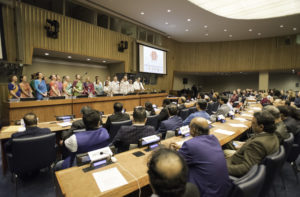
On 21 February 2018, the Peace Meditation Choir opens the Cultural Segment of the UN International Mother Language Day celebration at UN Headquarters, performing Sri Chinmoy’s songs in English and Bengali, and reading translations of his poetry representative of the Mother Languages of some of the singers. Held in Conference Room 4, the programme was cosponsored by the Permanent Missions of Bangladesh, Colombia, Fiji and Kenya, in collaboration with the UN Secretariat and UNESCO, as well as the Office of the Mayor of New York City.
Before we offer the answer to world-despair, let us first try to know why there is world-despair. World-despair exists because the world desperately needs the life-illumining light; the world constantly needs the life-energising love; the world immediately needs the life-immortalising delight.
The answer to world-despair is light, love, delight.
Talking, lecturing and advising the world can never be an adequate answer to world-despair. The most effective answer to world-despair lies in self-giving. But we learn the art of self-giving only after we have learned the art of self-finding.
And we learn the art of self-finding only after we have learned the art of meditating.
This short talk can give us only one per cent capacity to offer the answer to world-despair. But our sincere, deep and soulful meditation is bound to give us ninety-nine per cent capacity to offer the answer to world-despair. Let us all meditate only for light, love and delight. Light will open up our eye that sees. Love will open up our heart that feels. Delight will carry us to our Source.
Sri Chinmoy, The Tears of Nation-Hearts, 1974 (/tnh-17)
48. We Must Not Give Up!
Let us keep going. We must not give up! Although the dragon-thoughts of frustration assail us, we must not give up! There is definitely a goal, and this goal must needs be ours.
We must not give up!
Let us invoke the presence of our indomitable courage-fount to help us conquer the feelings of loneliness and unworthiness. We must not give up!
Although the world does not appreciate us, although the world does not see the beauty and the light in us, we must not give up appreciating the world. After all, what is appreciation? Appreciation is self-expansion. Self-expansion is oneness- awareness, and oneness-awareness is truth-distribution. We must not give up!
Although we do not have a sunny present, although we had a foggy past, although we suspect inclement weather in the near future, we must not give up!
With our mind’s resolution, our heart’s determination and our soul’s illumination, we shall eventually succeed in life.
We must not give up!
Sri Chinmoy, United Nations Meditation-Flowers and Tomorrow’s Noon, 1978 (/unm-22)
49. They Say and We Say
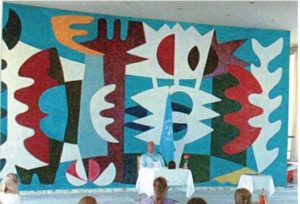
Sri Chinmoy leads one of the twice-weekly Peace Meditation Group sessions at UN Headquarters in New York,in later years held in the Penthouse of the Dag Hammarskjold Library building.
They say that the United Nations is a mere dream. We say that it is a dream that can grow into reality. Dream is the seed- essence. Reality is the fruit-substance.
They say that the United Nations is not independent. We say that there is no necessity for the United Nations to be independent, for the United Nations lives in the illumining heart of humanity and lives for the aspiring life of humanity.
They say that the United Nations is not powerful. We say that unless the world has given the United Nations the opportunity to show all its strength, outer and inner strength – but especially inner – how can it say that the United Nations is not powerful?
They say that the United Nations is not stable, that it is constantly changing its policies. We say that if a new policy embodies more light, more perfection and more satisfaction, then naturally it is the bounden duty of the United Nations to adopt the new policy instead of unwisely clinging to the old policy. The United Nations is growing into the perfection-tree that will offer its branches of concern, sympathy and oneness to humanity.
Sri Chinmoy, The Seeker’s Mind, 1978 (/sm-6)
50. To the End I Will Love the United Nations
Whoever leads the United Nations should use only the heart. The world will feel that the United Nations has a sincere heart. That sincere heart will be able to gain the confidence of the world. Now, because of unfortunate things that are taking place in various countries, the world does not have the same feeling, the same sympathetic heart.
Two things the United Nations can do. It can bravely speak out and say what it feels is the right thing to say, and at the same time it can beg the world to come to its rescue. It can also unreservedly take advice from the nations that are most sincerely ready and eager to help the United Nations come out of a very serious crisis.
To the end I will love and love the United Nations.
Sri Chinmoy, His Compassion Is Everything to Us, 2013 (/hce-9)
Highlighted Excerpts
The following highlighted excerpts are taken from additional talks given at the United Nations by Sri Chinmoy, that are not included in this publication.
Peace we achieve when we do not expect anything from the world, but only give, give and give unconditionally what we have and what we are.
Sri Chinmoy, The Tears of Nation-Hearts, 1974 (/tnh-22)
–––––––––––––––––––––
The inner heart of the United Nations is flooded with peace. The outer heart of the United Nations is trying to spread peace all over the world.
Sri Chinmoy, The Tears of Nation-Hearts, 1974 (/tnh-10)
–––––––––––––––––––––
The outer existence of the United Nations is a colossal hope. The inner existence of the United Nations is a fulfilling reality.
Sri Chinmoy, The Tears of Nation-Hearts, 1974 (/tnh-10)
–––––––––––––––––––––
The goal of the United Nations is peace, world peace. The secret of the United Nations is sacrifice.
Sri Chinmoy, The Tears of Nation-Hearts, 1974 (/tnh-10)
–––––––––––––––––––––
Many nations have formed the outer body of the United Nations. Peace is expected from each nation in abundant measure. When all nations work together devotedly and untiringly, then only can they embody universal oneness and reveal universal love.
Sri Chinmoy, The Tears of Nation-Hearts, 1974 (/tnh-10)
–––––––––––––––––––––
Today’s United Nations sees the nations as its true friends. Tomorrow’s United Nations will see the nations as its real sisters and brothers.
Sri Chinmoy, The Garland of Nation-Souls, 1972 (/gns-13)
–––––––––––––––––––––
Today’s United Nations offers hopeful and soulful advice to mankind. Tomorrow’s United Nations will offer fruitful and fulfilling peace to mankind.
Sri Chinmoy, The Garland of Nation-Souls, 1972 (/gns-13)
–––––––––––––––––––––
Patience is not peace. But patience eventually shows us the way to peace, world peace.
Sri Chinmoy, The Tears of Nation-Hearts, 1974 (/tnh-6)
–––––––––––––––––––––
Spirituality is the simplification of life. It comes to solve our problems.
Sri Chinmoy, Reality-Dream, 1976 (/rd-1)
Click here to open or download the pdf format of the 50th anniversary publication of 50 selected talks: The Vision of the United Nations: A Oneness-World-Family, Part 2
